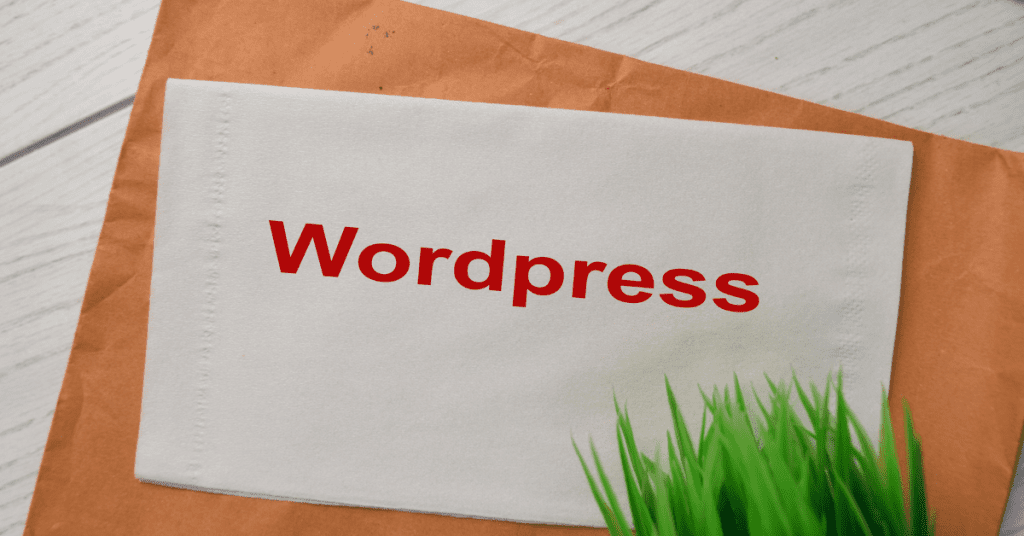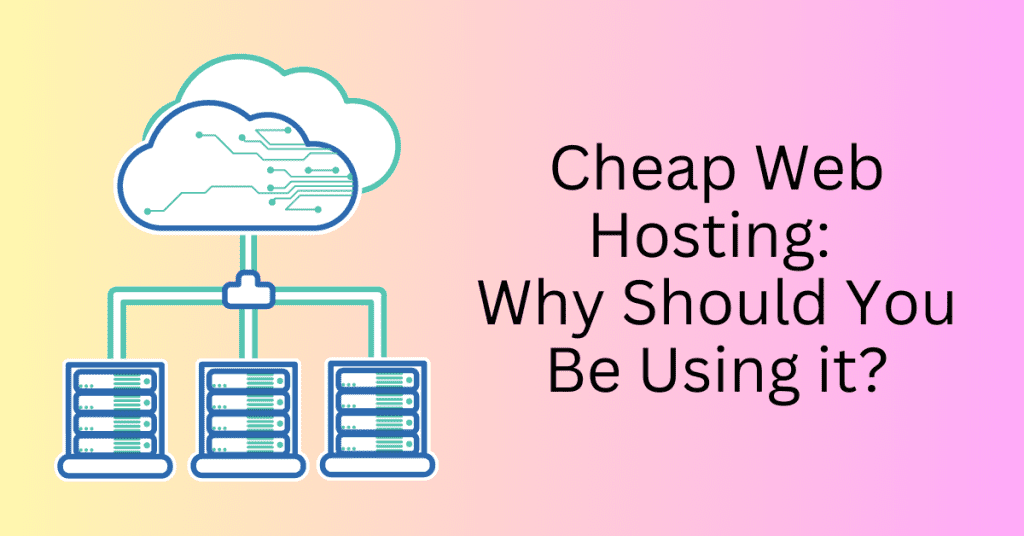In the dynamic world of online content creation, selecting the right platform is a pivotal decision for bloggers and website owners. Blogger and WordPress emerge as two prominent choices, each offering a distinct set of features, customization options, and trade-offs.
Whether you’re a novice blogger seeking a hassle-free start or a seasoned content creator with ambitious goals, the Blogger vs. WordPress debate revolves around finding the ideal platform that aligns with your unique needs.
In this comparison, we will explore the key differences and advantages of Blogger and WordPress, helping you make an informed choice to kickstart or advance your digital journey.
Start Your WordPress Website Now – Exclusive Deals Available
Blogger vs. WordPress: Brief Introduction
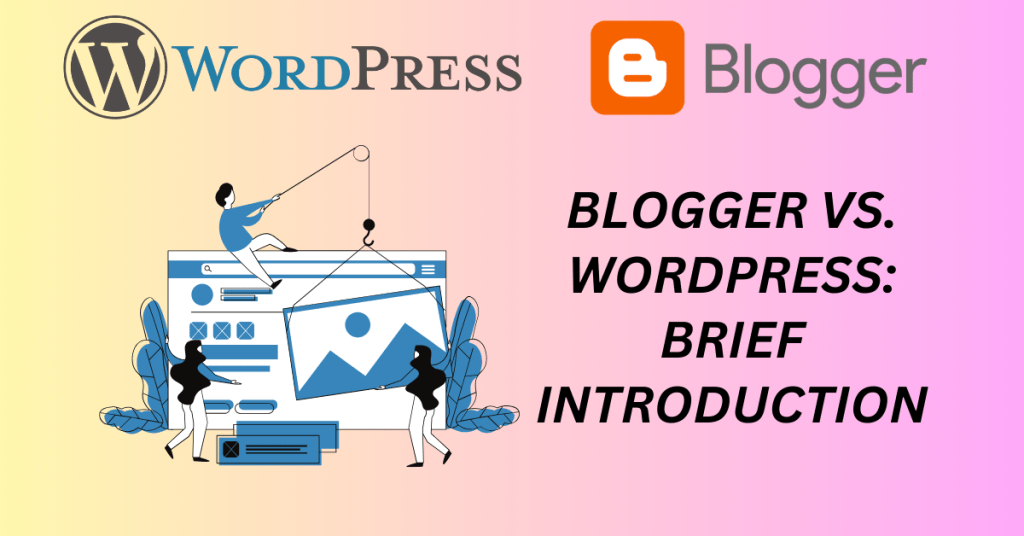
Firstly, we would need to understand both platforms before choosing them.
What is Blogger?

Blogger is a popular web-based platform designed for creating and managing blogs. It was originally developed by Pyra Labs and was later acquired by Google in 2003. Blogger provides a user-friendly and straightforward interface that allows individuals to publish their thoughts, ideas, and content online without the need for extensive technical expertise. Users can choose from a variety of templates and customize their blogs to suit their preferences. They can write, edit, and organize their posts, as well as incorporate multimedia elements like images and videos, all within the platform.
Blogger can be a good choice for blogging for several reasons. Firstly, it’s a free service, which makes it accessible to individuals who are just starting their blogging journey without a significant financial commitment. Second, it integrates seamlessly with other Google products, such as Google AdSense. This can help bloggers monetize their content through advertising. Additionally, Blogger offers reliable hosting and automatic backups, ensuring that your blog remains available to readers. While it may not have all the advanced features of some other blogging platforms, Blogger provides a simple and efficient way to share your thoughts and ideas with a global audience. This makes it a suitable choice for casual bloggers and those who prioritize ease of use.
What is WordPress?
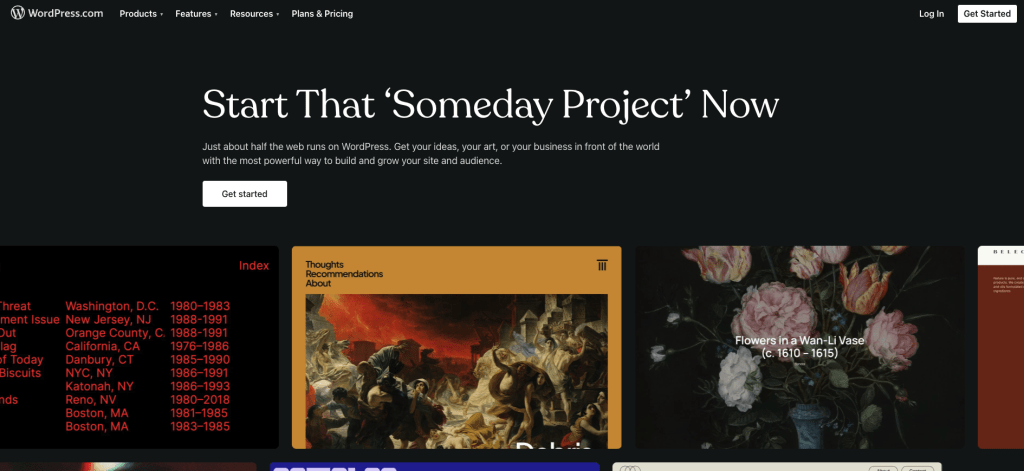
WordPress is a widely used content management system (CMS) that enables users to create and manage websites and blogs. It was initially developed as a blogging platform but has since evolved into a versatile CMS that powers a significant portion of websites on the internet. WordPress offers a user-friendly interface that allows users to publish content, manage their site’s design, and extend its functionality through a vast library of plugins and themes. It’s open-source software, meaning it’s free to use and is continually improved and expanded upon by a global community of developers.
WordPress is an excellent choice for blogging, particularly for those who are looking to build a professional and feature-rich blog. One of its key strengths is its extensive customizability, thanks to the vast number of themes and plugins available. This allows bloggers to create a unique and visually appealing blog while adding various functionalities like social media integration, e-commerce capabilities, and SEO tools. Moreover, WordPress offers powerful tools for optimizing content for search engines, making it easier for bloggers to attract organic traffic to their websites.
Furthermore, WordPress is highly scalable, which means it can grow with your blog. Whether you’re a casual blogger or planning to expand your blog into a full-fledged website, WordPress can accommodate your needs. It also provides excellent support for multimedia content, including images, videos, and podcasts, making it versatile for various content types. With its robust security features and regular updates, WordPress offers bloggers a reliable and secure platform to share their ideas and reach a wide audience, making it an excellent choice for those serious about blogging.
Start Your WordPress Website Now – Exclusive Deals Available
Setup and Ease of Use – Blogger vs. WordPress
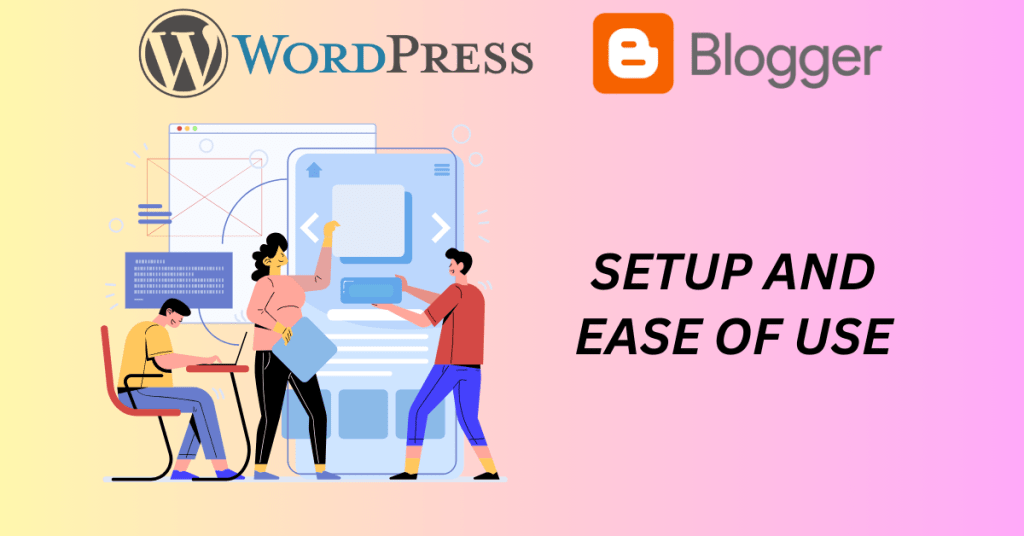
Blogger and WordPress differ significantly in terms of setup and ease of use. Let’s compare the two in these aspects:
Setup:
- Blogger: Setting up a Blogger blog is relatively straightforward. You need a Google account. Once you’re logged in, you can create a new blog by choosing a template and a blog address. Google handles the hosting, so there’s no need to worry about server configurations. It’s a very beginner-friendly setup process.
- WordPress: WordPress comes in two flavours: WordPress.com (hosted by WordPress) and WordPress.org (self-hosted). WordPress.com is somewhat similar to Blogger in terms of setup ease. You sign up for an account, choose a domain name, and you’re ready to start blogging. With WordPress.org, the setup is a bit more complex. This is because you need to find a hosting provider, install WordPress, and manage updates and security. In which, it requires more technical knowledge. However, many hosting providers offer one-click installations to simplify this process.
Ease of Use:
- Blogger: Blogger is known for its simplicity. The interface is clean and easy to navigate, making it a great choice for beginners. Writing and publishing blog posts is straightforward, and you can customize your blog using pre-made templates. However, it has limited design and customization options compared to WordPress.
- WordPress: WordPress offers more flexibility and functionality but can be a bit overwhelming for complete beginners. The block editor in WordPress is user-friendly and resembles popular word-processing software, making it easy to create and format content. WordPress also boasts an extensive library of themes and plugins for customization. This can be both an advantage and a challenge for those new to blogging. Some advanced features may require more technical knowledge.
Blogger is typically more straightforward to set up and use. This makes it a great choice for those who want a quick and easy way to start a blog. This is especially important if you’re not interested in advanced customization. On the other hand, WordPress provides greater flexibility and scalability. This makes it suitable for bloggers who want to have more control over their site’s design, functionality, and content.
However, it might require a steeper learning curve, especially if you opt for self-hosted WordPress. The choice between the two depends on your specific needs and your comfort level with the technical aspects of blogging.
Start Your WordPress Website Now – Exclusive Deals Available
Design and Customization Options – Blogger vs. WordPress

Design and customization options are where Blogger and WordPress differ significantly. Let’s compare the two in terms of design flexibility and customization:
Blogger:
- Design Templates: Blogger offers a limited selection of templates (themes) compared to WordPress. While these templates are relatively simple and easy to use, there are fewer options for unique designs.
- Customization: Blogger allows some basic customization options. You can adjust the layout, change fonts, and tweak colours to some extent. However, the level of customization is limited when compared to WordPress.
- Custom Themes: You can upload custom themes in Blogger. However, it’s not as intuitive as WordPress. Also, you might need to have some knowledge of HTML/CSS to make extensive changes.
WordPress:
- Design Templates: WordPress offers an extensive library of both free and premium themes. These themes cater to various styles, industries, and purposes, giving bloggers a wide range of design options to choose from.
- Customization: WordPress provides a high degree of customization. The block editor, introduced in WordPress 5.0, allows users to create complex layouts and easily format content without any coding knowledge. You can also change themes or customize them to a greater extent. Moreover, WordPress supports child themes, enabling you to make advanced customizations without affecting the core theme.
- Custom Themes: In WordPress, you can easily upload custom themes or even build your own themes from scratch or using theme builders like Elementor or Divi. This level of flexibility in design is a major advantage of using WordPress.
Overall, WordPress offers far more extensive design and customization options compared to Blogger. Whether you’re looking for a unique, highly customized blog design or want to create a website with a specific look and feel, WordPress provides the tools and resources to achieve your vision.
Blogger, on the other hand, is more limited in terms of design flexibility and may be better suited for those who prefer a simpler, less customizable approach.
Start Your WordPress Website Now – Exclusive Deals Available
Features and Functionality – Blogger vs. WordPress

Both Blogger and WordPress are popular platforms for creating and managing blogs, but they differ significantly in terms of features and functionality.
Blogger:
Blogger, owned by Google, offers a straightforward and user-friendly platform. It’s a solid choice for those who are new to blogging and want a simple setup. Blogger provides basic blogging features, allowing users to compose and publish posts with ease. It also integrates seamlessly with other Google services, such as Google AdSense, making it convenient for monetization.
However, Blogger has limitations in terms of design and customization options, and its range of available templates is relatively limited. Furthermore, it lacks a robust selection of plugins and extensions, which limits the functionality and scalability of the platform. While it’s a great choice for casual bloggers who want an easy-to-use platform, it may fall short for those seeking more advanced features.
WordPress:
On the other hand, WordPress is a versatile content management system (CMS) that extends beyond blogging. It offers an extensive library of themes and plugins, making it a powerhouse for customization and functionality.
WordPress is a go-to choice for bloggers and website owners who desire a highly flexible and scalable platform. The block editor simplifies content creation and formatting, and a wide array of themes caters to various styles and industries.
With the support of a multitude of plugins, users can enhance their website’s capabilities with features like e-commerce, SEO optimization, and social media integration. WordPress also provides greater control over SEO, allowing users to fine-tune their content for search engines effectively. Its scalability means you can start as a blogger and later expand into a full-fledged website with ease.
Overall, Blogger offers simplicity and ease of use but with limited features. WordPress on the other hand, offers extensive customization, advanced functionality, and scalability. This makes WordPress an ideal choice for bloggers and website owners with diverse needs and aspirations.
Start Your WordPress Website Now – Exclusive Deals Available
SEO and Marketing Capabilities – Blogger vs. WordPress

When it comes to SEO and marketing capabilities, Blogger and WordPress exhibit notable disparities.
Blogger:
Blogger, as a basic blogging platform, offers rudimentary SEO tools. Users can set meta descriptions, titles, and customize URL structures.
However, the level of control and optimization is quite limited. Blogger also doesn’t support third-party SEO plugins, which means users have fewer options to enhance their site’s SEO performance. The platform does benefit from its integration with Google Search Console, a valuable tool for monitoring a blog’s performance in Google search results.
Additionally, Blogger seamlessly integrates with Google AdSense, simplifying the monetization process through advertising. While Blogger can suffice for those who require minimal SEO and marketing capabilities, it lacks the depth and flexibility provided by WordPress.
WordPress:
In contrast, WordPress stands as a robust and versatile platform for SEO and marketing. WordPress boasts an extensive array of SEO plugins like Yoast SEO and All in One SEO Pack, offering comprehensive control over a website’s SEO optimization. These plugins include features like XML sitemaps, meta tags, and content analysis to improve search engine rankings.
WordPress also allows for the creation of custom and SEO-friendly permalinks, enhancing visibility in search results. Many WordPress themes are designed with SEO in mind, ensuring that the website’s structure is conducive to optimal search engine performance.
The platform integrates seamlessly with various marketing tools and services, facilitating email marketing, social media sharing, and e-commerce endeavours. With WordPress’s content creation tools, including the block editor, users can craft engaging and shareable content—vital for content marketing strategies.
Additionally, WordPress offers numerous plugins for e-commerce and membership site integration, catering to a wide range of marketing objectives.
Overall, Blogger is a simpler platform with limited SEO and marketing capabilities, ideal for beginners and straightforward blogging. In contrast, WordPress provides advanced SEO tools, a more substantial array of marketing options, and the flexibility needed for both bloggers and website owners aiming for a comprehensive online presence and effective marketing strategies.
Start Your WordPress Website Now – Exclusive Deals Available
Security and Customer Support – Blogger vs. WordPress

Security and customer support are critical aspects of any blogging platform, and Blogger and WordPress differ in how they address these concerns.
Blogger:
Blogger, being a Google-owned platform, provides a level of security through its association with one of the tech industry’s giants. Google invests significantly in security infrastructure, which indirectly benefits Blogger users.
However, Blogger’s security features are relatively basic, and users have limited control over site security. While Google automatically handles server-side security, such as protecting against DDoS attacks, users must rely on Google’s security measures for their blog’s protection.
Blogger doesn’t allow users to install security plugins or take additional measures to fortify their blogs. In terms of customer support, Blogger offers a basic support forum and documentation, but it may not be as comprehensive or responsive as some users might prefer.
WordPress:
WordPress, on the other hand, provides a more comprehensive and flexible approach to security. While the core WordPress software is secure, users can enhance their site’s security by installing various security plugins, such as Wordfence or Sucuri, to protect against malware, brute force attacks, and other threats.
WordPress also benefits from an active open-source community that frequently updates the software to patch security vulnerabilities. Users have more control over their site’s security, but this also means they bear greater responsibility for its protection.
In terms of customer support, WordPress offers extensive resources in the form of documentation, forums, and a large community of users and developers who actively participate in troubleshooting and providing support. Additionally, premium support options are available through managed WordPress hosting providers, offering even more robust customer support.
Overall, Blogger’s security is somewhat hands-off, with Google providing basic protection measures. However, users have limited control and flexibility in this regard. Customer support is available, but it may not be as robust as some users desire.
WordPress, while initially secure, offers users the flexibility to enhance security through plugins and community-driven updates. Its extensive user community and documentation make it easier for users to find support and guidance. The choice between the two platforms depends on the user’s comfort level with managing security and their need for support resources.
Start Your WordPress Website Now – Exclusive Deals Available
Pricing and monetization – Blogger vs. WordPress

Pricing and monetization options significantly differ between Blogger and WordPress, which can influence your choice of platform based on your financial considerations and monetization goals.
Blogger:
Blogger, owned by Google, offers a straightforward and cost-effective solution for bloggers. One of its key advantages is that it’s entirely free to use. Google hosts your blog on its servers, eliminating the need for hosting expenses. This makes Blogger a popular choice for those who want to start a blog without any initial financial investment.
However, this cost-saving feature comes with a trade-off; Blogger has limitations in terms of monetization. While it seamlessly integrates with Google AdSense, allowing users to earn revenue through ads, it restricts the ability to use other advertising networks or implement more complex monetization strategies.
This can be a drawback for bloggers aiming to diversify their income streams.
WordPress:
In contrast, WordPress offers both free and paid options, providing more versatility when it comes to pricing and monetization. WordPress.org, the self-hosted version, offers the most flexibility.
While the WordPress software itself is free, you’ll need to purchase a domain name and pay for hosting, which can range in cost depending on your needs and the hosting provider you choose.
This investment is worthwhile for bloggers and website owners who want to monetize through various means. WordPress allows you to use ad networks like Google AdSense and other platforms, sell products or services, incorporate affiliate marketing, and implement subscription models or memberships.
Additionally, with the help of e-commerce plugins, you can set up online stores. WordPress provides greater freedom and potential for diverse income streams, making it an attractive option for monetization.
Overall, Blogger is a cost-effective choice for those who want to start a blog without any upfront expenses. It’s ideal for beginners but comes with limitations in terms of monetization options.
WordPress, especially the self-hosted version, provides more versatility when it comes to pricing and offers a broad spectrum of monetization possibilities. However, you must be prepared to invest in domain registration and hosting services, making it the preferred choice for bloggers and website owners with diverse monetization goals.
Blogger vs. WordPress: Which platform is right for you?
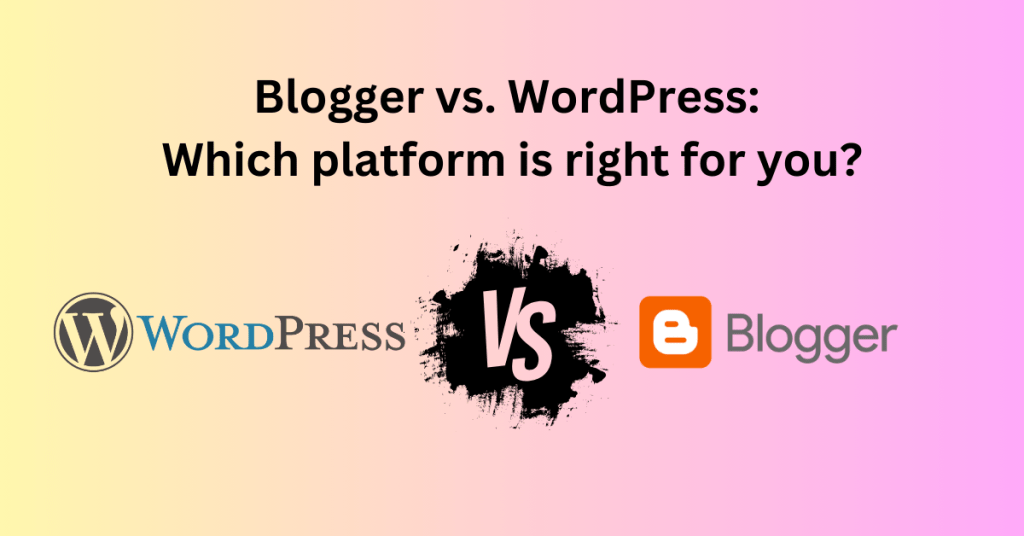
Choosing between Blogger and WordPress depends on your specific needs, goals, and comfort level with web technologies. Each platform offers a distinct set of features and trade-offs that cater to different types of users.
Blogger:
Blogger is a straightforward and user-friendly platform, ideal for beginners who want to start blogging with minimal hassle. It’s entirely free, hosted on Google’s servers, and requires no technical setup or maintenance.
Blogger provides basic blogging features, making it easy to compose and publish posts, and it integrates seamlessly with Google services like AdSense for straightforward monetization. However, Blogger has limitations in terms of customization and functionality. You have a limited selection of templates, and customization options are relatively basic.
If you have aspirations for more advanced design, features, or monetization strategies, Blogger may not be the best choice. It’s most suitable for casual bloggers looking for a hassle-free way to share their thoughts online.
WordPress:
WordPress, on the other hand, is a powerful and versatile platform that can serve a wide range of users. There are two options available: WordPress.com (hosted by WordPress) and WordPress.org (self-hosted).
WordPress.com is user-friendly and similar to Blogger in terms of setup. However, it provides greater design flexibility, access to a broader range of themes and plugins, and better control over your content. If you opt for self-hosted WordPress (WordPress.org), you gain even more control. You can choose from thousands of themes and plugins to customize your website and add advanced features. This makes it suitable for bloggers and website owners with diverse goals, whether it’s blogging, e-commerce, portfolio sites, or business websites.
The trade-off is that you’ll need to invest in domain registration and hosting, and there’s a steeper learning curve if you want to harness its full potential.
If you seek a hassle-free and free blogging experience, Blogger can be a good starting point, especially if you’re a beginner. However, if you have ambitious goals, want advanced customization, require diverse monetization options, or aspire to create a professional website, WordPress, particularly the self-hosted version, is the preferred choice.
It offers the flexibility and scalability to grow with your needs, but it does require more involvement in terms of setup and maintenance. Ultimately, your decision should align with your blogging or website objectives and the degree of control and customization you desire.
Start Your WordPress Website Now – Exclusive Deals Available
Final thoughts: Blogger vs. WordPress
In the Blogger vs. WordPress debate, the right choice ultimately hinges on your specific needs and aspirations for your online presence. Both platforms offer distinct advantages and trade-offs, and understanding your priorities can help you make an informed decision.
Blogger is a fantastic entry point for those new to blogging. Its simplicity and no-cost setup make it an attractive option for casual bloggers. If you’re looking for an easy way to share your thoughts without dealing with technical complexities or upfront costs, Blogger can serve your needs adequately.
However, keep in mind its limitations in design, customization, and functionality, especially if you anticipate future growth or monetization beyond basic advertising.
WordPress, on the other hand, caters to a broader range of users. WordPress.com is an excellent middle ground between ease of use and customization, offering a wide array of themes and plugins to enhance your website’s design and functionality.
For those seeking the utmost control, scalability, and potential for diverse monetization strategies, WordPress.org, the self-hosted version, is the clear winner. While it requires more initial investment and technical involvement, it grants you the power to create a professional website or blog with unlimited possibilities.
In the end, Blogger and WordPress each serve a specific niche. If simplicity and quick setup are your priorities, Blogger is a suitable choice. For those with more ambitious blogging or website goals,
WordPress, especially the self-hosted version, offers the versatility and functionality to bring your vision to life. Consider your long-term objectives, budget, and technical comfort when deciding which platform aligns best with your blogging journey.
Start Your WordPress Website Now – Exclusive Deals Available
